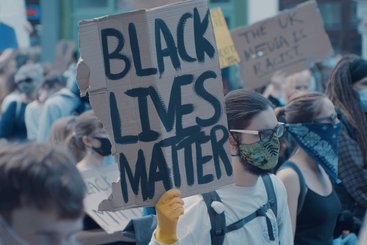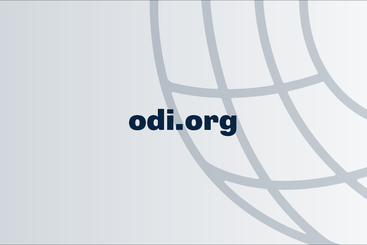ODI is a think tank that for more than sixty years has gained a reputation as a thought leader on international development and global affairs, and for its production of robust, reliable, often quoted, evidenced-based policy research.
The murder of George Floyd in 2020, at the height of the COVID pandemic, which unleashed demands for racial justice worldwide, was a pivotal moment for ODI when calls for racial justice and the decolonisation of development thinking became particularly loud amongst young minority black and brown staff.
This period saw ODI begin to proactively use its platforms to profile more marginalised voices from the Global South and Diaspora, and to convene difficult conversations on racism in the international development sector.
The last few years has certainly opened space inside and outside ODI for much conversation about power asymmetries (as evidenced by new popular tag lines such as ‘Shift the Power’, ‘Locally Led Development’, ‘Localisation’).
Today the loudest advocates for taking racism seriously are increasingly cited, courted and called upon to facilitate conversations about shifting power to the global south, and Diversity, Equity and Inclusion (DEI) initiatives proliferate in organisations keen to review their recruitment and retention policies. But even if the DEI space creates some scope for discussions on race and racism, these conversations rarely permeate research on core development issues, such as trade, development finance, climate finance or international action in situations of violent conflict. A serious reckoning with race and racism in the production of knowledge remains far off and is still hotly contested.
For ODI, decolonising its approach to the production of knowledge means acknowledging the role that race, legacies of racism and the current workings of racism play, in shaping how we think about what constitutes knowledge, how it comes to be constructed and how it gets to be considered as robust or not.
This is why for ODI, Black History Month (BHM) is so important, not just for the month of October, but all year round. By bringing to light the little acknowledged contributions of Black people to British and global history, BHM is an example of knowledge production practice with racial justice at its core.
By asking questions about the nature of evidence, who produces it and how, what counts as knowledge, who’s vision of the world is included, excluded or simply ignored, ODI aims to contribute to what some have called ‘epistemic justice’ – to ensure that the knowledge we produce about the world – the stories we tell – even if underpinned by social scientific method – do not exclude or silence the very people in whose interests we claim to be doing the research.
In recognition of this year’s BHM focus on the critical contributions of Black women to history, and in line with ODI’s longstanding research commitment to gender justice, ODI invited three leading women thinkers (Dr Althea-Maria Rivas, Dr Lilian Umubyeyi, and Professor Gargi Bhattacharyya) who have been collaborating with ODI over the last year, to share their thoughts on the relevance of BHM to their struggles to decolonise the production of knowledge. Their reflections provide a welcome and thought-provoking antidote to populist discourses that deliberately downplay the significant role that the most marginalised have and continue to play in shaping our collective histories and futures.
Dr Althea Maria Rivas: "Black women have often been at the forefront of resistance and struggles for peace and liberation and activism"
Black History Month is a time to celebrate, encourage learning about the contributions that Black people have made to our world, and to highlight and centre the diverse and dynamic histories that when brought together make up an incredible story of the global black experience that has been fundamental to shaping our world.
It is also a reflective time to acknowledge the many ways in which that knowledge, experience and lives have been suppressed and historically, but also the ongoing racism that attempts to shame and the erasure of black voices.
This year the theme of BHM is Saluting our Sisters and as a Black feminist I am deeply concerned with injustice. I think it is particularly important to recognise the way Black women have often been at the forefront of resistance and struggles for peace and liberation and activism, and also to recognise their brilliant and creative minds. Minds that have produced knowledge within so many different sectors and spaces. Yet, we know that those ideas are often ignored or appropriated by others for their own purposes and self-promotion.
Much of my research over the last 15 years has focused on challenging the silences in the aid sector on race, racism, and exclusion which have obstructed our understanding of the prominence of racialised discourses and practices in development. I use the work of radical Black and decolonial feminists to create a deeper understanding of the politics and racialised gendered realities of violence, conflict and development and the related struggles for justice, peace, social change and development. My current work is trying to push the boundaries of debates on gender, conflict and development, an area of research that has developed over time yet often resisted engaging with intersectional injustice and particularly issues of race. Ultimately, the development industry has to face its history and continued entanglements with race, racism and white supremacy, because those silences cannot be allowed to persist anymore.
My current project puts a slightly different spin on, Professor Cynthia Enloe’s famous question ‘Where are the women?’ and asks, ‘Where are the Black women in peace, security and development?’. The research argues that Black women are key actors in the international peace and security landscape. Using narratives, photovoice and interviews the book will explore the roles and experiences of Afro-descendant women in conflict are beyond the tropes of aid targets, peace activists or American military soldiers in three case studies in Africa, the South Pacific and Latin America and the Caribbean.
So just a few months into what will be a long and extensive project, and as we move forward to the end of 2023 and BHM 2023 falls to the rearview, it is essential to remember that there is much work to be done to centre the experiences and contributions of Black women to shaping our world. BHM is an important and special moment every year but only part of an ongoing project.
Dr Liliane Umubyeyi: "We are not only here to celebrate, we are also here to talk about the persistence of violence, of inequalities..."
Black History Month is important for us at African Futures Lab because it's important to celebrate the achievements and the contributions of Black people, in international histories, but we also think that it's fundamental. It is crucial to go beyond celebrations and to look at persistent violent injustices that affect Black people all over the world and their demands for justice and reparations. And this is exactly our contribution to this debate, through a series of seven reports that we have just started to publish on demands for justice and reparations. What these reports show is that demands for justice and reparations have been silenced, have been ignored by the international development sector and by the international human rights sector. Yet these demands concern the daily contemporary lives of African people, of Black people, both on the Continent and in the diaspora.
A concrete example of this silencing, is highlighted in one of our reports which looks at the situation of children, mixed race children, that were abducted from African mothers by European colonial administrations past. The case we're working on took place in the Great Lakes region.
These children were removed from their mothers, placed in religious institutions, and some of them were physically uprooted and taken to European countries. The families, the children, and some of the mothers are still alive and are today asking for justice and reparations. Yet when we talk about, gender-based violence on the continent, when we talk about different forms of child abuse taking place on the continent, when we talk about forced displacement, we do not hear about these cases. In fact, in international development, there is total silence around the very existence of these cases.
We don't hear about the crimes that were committed by colonial administrations in the past, whether it's Belgium, whether it's in the UK, whether it's in France. Yet we still have victims who are alive today and who are asking for justice and reparations.
So, for us, BHM is also a space, an opportunity, a moment when we can have a much needed conversation about these questions that have been silenced. We are not only here to celebrate, we are also here to talk about the persistence of violence, of inequalities, of injustices that affect people, Black people in the diaspora, but also on the African continent.
Gargi Bhattacharyya: "If you silence what has happened to Black people across the globe, you silence how the violence of capitalism has limited all our lives"
I really support Black History Month, but I feel very torn about it. People have really struggled to have BHM recognised in the UK and across the world because of the ways that the histories of the African diaspora in particular have been silenced or raised and misrepresented. And that misrepresentation is a misrepresentation of all global history. If you silence what has happened to Black people across the globe, you silence how the violence of capitalism has limited all our lives and how it takes things from people and gives them to others. How it cuts lives short and how it makes us all less than human. I work on racial capitalism, which is a framework that tries to understand how capitalism, its formation at its development has been reliant on and kind of parasitic vis-à-vis structures of racism and continues to be. So that there is no capitalism that's not implicated in systems of racism. And I think BHM helps us to focus on understanding what that means in all kinds of processes, both within one country, about how some groups of people become rendered less than, less entitled, have rights stripped from them, have assets stripped from them and globally how we see the global system of death for some, and consumerism for others remade again and again.
I also feel very torn about having a focus on Black Women this year, although I understand why it's really needed, because there is such a paucity of knowledge about black histories and the particular lives that key activists and figures have led that has been erased from popular consciousness.
And if you don't have a month that says, actually Black Women now, people just don't have an opportunity to hear what Black Women across the diaspora or and across the ages have done. But saying that, I don't subscribe to a model of analysis of racial capitalism that says it was worse for women than for men or worse for this group than for that group. What I would prefer to focus on, is how gendering (male and female) works as a technology or technique of power that has been used against the African diaspora and other racially subjugated people as a tool of violence. That is really the important message that I believe people need to hear and what a focus on Black History needs to bring to light, for the month just passed and many months to come.




